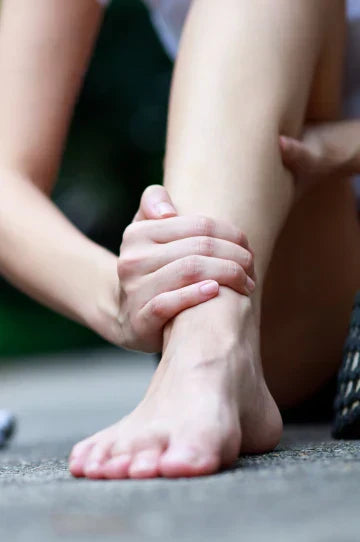




What are you looking for?

Reduce muscle pain after workout with Muscle Mercy. Herbal solution to cure muscle soreness, body pain, and accelerate recovery. Buy now!
After a satisfying workout, muscle soreness can feel like a badge of honor—but when it turns painful or lingers, it can disrupt your momentum, motivation, and well-being. Whether you're a seasoned fitness lover, a newbie at the gym, or someone easing back into exercise, post-workout muscle pain is a shared experience.
That familiar stiffness or ache 12 to 48 hours after a workout is called Delayed Onset Muscle Soreness (DOMS). It results from microscopic tears in your muscle fibers, especially after intense sessions like HIIT, resistance training, or any new movement. Your body’s natural response includes:
This discomfort is part of building strength—but that doesn’t mean you have to live with it.
In Ayurveda, sore muscles often reflect an imbalance in Vata dosha (which governs movement and nerve activity) along with the presence of Ama (toxic residue from poor digestion or circulation). After exercise, if your body’s Agni (digestive and metabolic fire) is low or you're depleted, the repair process slows down—leading to lingering pain, tightness, or fatigue.
Ayurveda offers powerful and holistic ways to ease muscle discomfort—without depending on harsh chemicals or painkillers:
Promotes circulation, detoxifies tissues, and helps relax tight muscle fibers.
Herbs like Nirgundi and Dashmool work synergistically to reduce inflammation, ease stiffness, and promote regeneration. acne sos
Opt for light, warm, and protein-rich meals with digestive spices like ginger and turmeric to support muscle healing.
Drink warm water or detoxifying herbal teas (like fennel-cumin) to flush toxins and soothe the nervous system.
muscle mercy is a doctor-formulated, plant-powered topical oil that provides fast relief from:
It penetrates deep into tissues, calms nerve endings, and supports faster healing—naturally and effectively.
Each herb in muscle mercy has been chosen for its proven benefits in both traditional Ayurvedic practice and modern science:
An Ayurvedic powerhouse for joint and muscle pain, Shallaki reduces inflammation, supports joint lubrication, and promotes mobility—making it ideal for sore or overworked muscles. tranquil tonic
This warming root improves circulation, soothes stiffness, and speeds up recovery by flushing out toxins and reducing post-workout inflammation.
Used for centuries in managing Vata-related pain, Rasna helps calm muscle spasms, ease joint discomfort, and improve range of motion.
A well-known Ayurvedic analgesic and anti-inflammatory herb, Nirgundi targets deep tissue pain and provides relief from soreness, sprains, and ligament strain.
Known for its natural analgesic properties, clove reduces muscular tightness, relaxes nerves, and brings warmth to the affected area, enhancing circulation and comfort.
A potent herb in classical Ayurveda, Vijaya works through the body’s endocannabinoid system to reduce pain perception, calm nerve sensitivity, and relax muscle tension—supporting faster recovery and deep tissue healing.
Apply post-shower while pores are open for deeper relaxation and better results.
 muscle mercy" loading="lazy">
muscle mercy" loading="lazy">A: It’s due to micro-tears in muscle fibers. This triggers inflammation, which your body repairs—causing soreness known as DOMS.
A: Use muscle mercy oil, drink warm fluids, rest, and apply heat.
 muscle mercy" loading="lazy">
muscle mercy" loading="lazy">A: Dashmool, Nirgundi, and Mahanarayan Taila are highly effective and are all included in muscle mercy.
A: Mild activity like walking or yoga is okay. Avoid intense workouts until soreness reduces.
A: 1–2 times daily, ideally after workouts or before sleep.
A: Warm, protein-rich foods with spices like ginger, turmeric, and black pepper. Avoid cold, heavy, or raw meals immediately post-exercise.
A: Absolutely. It’s highly effective for stiff joints, lower back pain, and neck tension.
Muscle soreness is a natural sign of progress—but that doesn’t mean you have to tolerate it. Rather than masking the pain with synthetic creams or pills, choose a healing solution rooted in Ayurvedic wisdom. period pacifier
muscle mercy is your clean, plant-powered companion for post-workout recovery, joint support, and daily wellness. Whether you’re lifting weights or lifting grocery bags—your muscles deserve mercy.
All posts